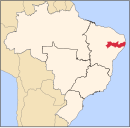|
Gameleira
Gameleira is a city in Pernambuco, Brazil. The name Gameleira is derived from the large number of Gameleira trees (family Moraceae) that were growing in the region. The city is 99 km away from Recife, the capital city of Pernambuco. Gameleira has a bus terminal, a public library, two state schools and several municipal schools. HistoryThe district of Gameleira was created by Provincial Law 763 (Lei Provincial n° 763), on July 11, 1867. It was then part of the municipality of Sirinhaém. In 1872, it became a village (Lei Provincial n° 1.057). In 1860, the Recife–São Francisco Railroad established a station in Gameleira. Local sugarcane plantations used the railroad to transport sugar to the port in Recife. Geography
EconomyThe main economic activities in Gameleira are based in agribusiness, especially plantation of sugarcane; and creations of cattle and buffalos. Economic indicators
Economy by Sector
Health indicators
See alsoReferencesExternal linksWikimedia Commons has media related to Gameleira. 8°35′S 35°23′W / 8.583°S 35.383°W
|
||||||||||||||||||||||||||||||||||||||||||||||||||||



